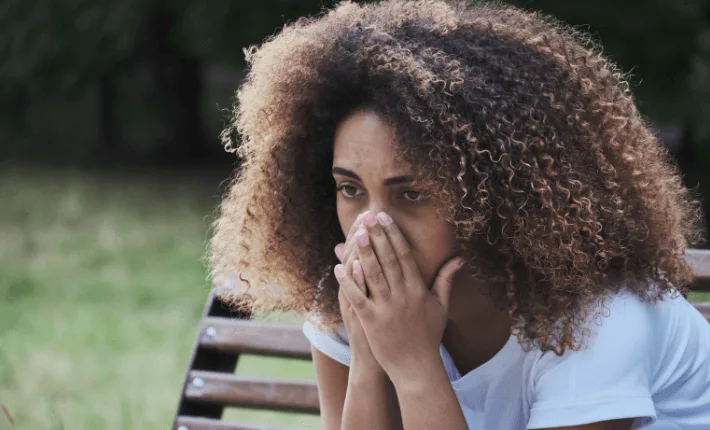Period Acne: Causes, Remedies & Tips to Prevent Pimples Before and During Your Period

Ever noticed a breakout of acne before your period? Say hello to period acne, as if the cramps, bloating and backache wasn’t enough. Most women notice a pimple or pimples pop out right before they get their period, and that is not always a coincidence. Period pimples or period acne are hormonal breakouts that you get when you are about to get your periods.
What is period acne?
Period acne is one of the symptoms of Pre-menstrual Syndrome (PMS). It is firstly important to recognise period acne from a usual breakout. It all lies in the timing. With period acne, you will notice an acne flareup every month about a week or so before you get your period or during it. You’ll also see that the breakout or pimple situation tends to improve as your period comes to an end.
If you already have acne, then brace yourself as it may just get worse in the week leading to your period. Those who have a relatively clear skin, may find a pimple or two popping up.
What causes period acne?

The simple answer would be hormonal changes that trigger period acne. Let’s try and understand all that goes into play. Each day in your menstrual cycle has a different hormone level. Estrogen is the dominant hormone in the first half of a woman’s menstrual cycle, while in the second half, the main hormone is progesterone. Both these hormones fall to their lowest levels of the month as you near your periods.
On the other hand, testosterone, which is the male hormone made in smaller amounts in women, remains constant throughout the month. So, when estrogen and progesterone level fall before and during menstruation, testosterone is comparatively higher than the female hormones. These shifts in hormones happening over the course of the month affect a person’s skin. For instance, when the level of progesterone rises around the middle of your cycle, it stimulates the production of sebum - a thick, oily substance that acts as a natural skin lubricant.
This results in the skin swelling and pores getting compressed and shut, making the pores appear minimised. However, this also causes sebum to build up underneath the skin’s surface. Moreover, during menstruation, when the levels of testosterone run high, it further activates the production of more sebum.
Acne before periods and after periods
While some women experience a healthy glow due to this sebum production, others have a chronic oil slick. The oil serves as food for acne-causing bacteria leading to breakouts and inflammation before and during your periods. However, once your periods come to an end, you will observe that your period acne and pimples too would have begun to subside.
What are tips to soothe period acne?
Period pimples and breakout can particularly be painful. Here are some quick tips to help alleviate the inflammation.
- Try using a warm compress for 10 to 15 minutes at a time, three or four times a day. This will help soothe the pain and help draw out pus.
- For relief from swelling and pain, you can try using a cold compress or ice 5 to 10 minutes at a time.
- Wash your face twice a day using a gentle cleanser that doesn’t strip your face of its moisture.
- You can try using tea tree oil as spot treatment. Tea tree oil is known to kill bacteria and improve mild to moderate acne.
It is important to note that you always consult a doctor before making any changes to your skin care routine, especially with acne.
Period acne also means that your periods are just around the corner, so better stock up on your favourite ALWAYS sanitary pads. The ALWAYS Platinum Ultra Thin Pads are the ultimate sanitary pads available. They have a combination of innovative micro-cushions and an ultra-absorbent core, which instantly locks in the wetness. ALWAYS’ Platinum Range of Ultra Thin sanitary pads are extra-long and powered with odour neutralising technology so that you always stay fresh and clean.
If you prefer tampons instead, TAMPAX Compak tampons are a great option. These come with a smooth, compact applicator for discretion, and a built-in protective skirt to help prevent leakage for up to 8 hours. They are also available in different absorbency variants to best suit your flow.
What are some preventive measures for period acne?

While you can’t do anything about the hormones that cause acne, you can take certain preventive steps care in order to not aggravate things.
1. Birth control and prescription medication -
Birth control pills increase a protein called SHBG (sex-hormone binding globulin) in the blood which soaks all the extra testosterone in the bloodstream. This means there is less testosterone available to cause acne. Birth control pills also slow down production of oil, restricting any flareups.
However, always consult a doctor before resorting to any medication. Also, if birth control pills aren’t your preferred choice or don’t work for you, your doctor can prescribe other relevant medication to manage period acne.
2. Maintain good skin hygiene habits -
The below are great tips for daily use:
- Keep irritants at bay and avoid products that can irritate your skin such as greasy sunscreens, cosmetics, oils, and concealers.
- Make sure to avoid skin friction from things such as tight collars, straps, or helmets.
- Restrict exposure to UV rays by staying out of the sun. Use lightweight, non-oily moisturisers with sunscreen.
- Avoid touching your face often as your hands can introduce dirt and bacteria.
- Phones breed a lot of bacteria and holding them leaves your most vulnerable area susceptible to hormonal acne: your jaw line and chin. So, clean your phone regularly.
3. Manage your diet -
Maintaining a healthy diet that regulates your blood sugar levels can help with hormonal acne. Consider avoiding the below foods which are high in GI (The GI is a measure of the rate at which a food spikes blood sugar levels):- sugary foods and drinks
- white bread
- other highly processed foods
Restricting the intake of the above can also help in reducing inflammation.

When to see a doctor
If you notice other symptoms along with breakouts and period acne, you could have an underlying condition like Polycystic ovary syndrome (PCOS), a common hormonal disorder that causes a range of symptoms.
Consult your doctor if you notice any of the below symptoms:
- missed periods or irregular periods
- excessive growth of facial and body hair
- sudden weight gain or facing difficulty in losing weight
- dark patches of skin on the back of your neck and other areas
- thinning of hair or hair loss
Period pimples and acne are totally normal and almost every woman goes through it. Making some dietary changes can help restrict the flareups in the long run. Talk to your doctor if the breakouts hamper your peace of mind.
Read more about period symptoms and what causes period pains.
Stay well prepared for your next period by tracking it on Always Period Calculator.
FAQs
How to get rid of period acne naturally?
Practicing good skin hygiene like avoiding touching your face, cleaning your cell phone screen since it comes on contact with your cheek and chin, avoiding excessive use of products that clog your pores etc. will help in reducing breakouts. Maintaining a healthy diet that regulates your blood sugar levels can also help with hormonal acne.
How to prevent acne before period?
Eating a well-balanced diet, maintaining a healthy weight, and practicing good skin hygiene may help control acne before your period. You could also try using birth control and other prescribed medication if your breakouts get painful after careful consideration and consultation with a doctor.
Is it normal to get acne during your period?
It is completely okay and normal for you to get acne before or during your period. The various hormonal changes in your body may cause period acne. If you already have acne, then brace yourself as it may just get worse in the week leading to your period. Those who have a relatively clear skin, may find a pimple or two popping up.
Disclaimer:
Please note the date of last review or update on all articles. No content on this site, regardless of date, should ever be used as a substitute for direct medical advice, diagnosis or treatment from your doctor or other qualified clinician. Always is committed to ensuring that all of our products meet rigorous safety standards; Always pads prioritize safety, protection and comfort of its consumers.




